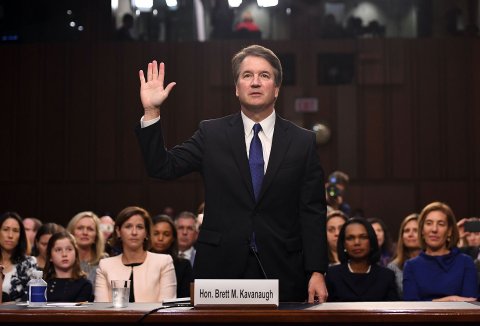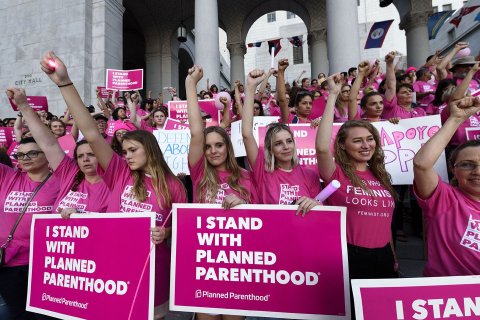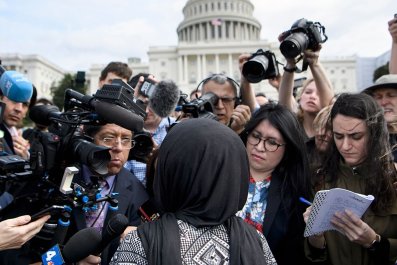For more than a decade, Cecile Richards was the public face of the abortion rights movement. Wearing her trademark blue—and sometimes hot-pink—suits, the head of Planned Parenthood saw the national women's health organization through a tumultuous time, from escalating death threats on abortion providers to increased protests of clinics to the viral controversy over fake videos that alleged her group profited from fetal remains. Then, last year, she stepped down. But her resignation, she tells Newsweek, is far from a retirement.
Her latest book, Make Trouble: Standing Up, Speaking Out and Finding the Courage to Lead, serves as a guidebook for a new generation of feminist activists; the paperback edition—released in March—includes a nine-point "Women's Declaration of Independence." The mission to protect abortion rights, she says, is more urgent than ever.
President Donald Trump, of course, has appointed two Supreme Court justices believed likely to vote to overturn Roe v. Wade, the landmark 1973 ruling legalizing abortion in the United States, if given the opportunity. And the Trump administration has targeted reproductive health in other ways. In May 2018, the Department of Health and Human Services announced it intended to block clinics that counsel or provide abortions—including Planned Parenthood—from receiving funds from the so-called Title X program, which provides more than $250 million annually for birth control and other reproductive health care services to approximately 4 million people. The final version of the so-called "gag rule" was published March 4 in the Federal Register. On March 12, a federal appeals court upheld an Ohio law declining public funding for Planned Parenthood.
Meanwhile, Republican-controlled state legislatures have passed hundreds of pieces of legislation curtailing or outright banning abortion; other measures have even sought to outlaw or limit access to certain methods of contraception. Eight states now have only one abortion clinic left.
Richards spoke to Newsweek about the Trump resistance, House Speaker Nancy Pelosi and misogyny as an organizing principle.
What is your prognosis for the legality of abortion?
What's become abundantly clear is that this administration and a lot of politicians nationwide are set on not only ending access to safe and legal abortion, but ending access to birth control and preventive health services.
Short term, these moves will have a devastating impact on women, especially low-income women—and this at a time when we have the lowest rate of abortion since Roe was decided, when unintended pregnancy is at a 30-year low and when teenage pregnancy is at a historic low. The administration should be asking how can we do more of this, rather than taking away these protections.
Long term, this administration is jamming through appointments at a record pace, reshaping the federal judiciary into a much less friendly place for women.
You say Nora Ephron's line "Be the heroine of your own life" is the theme for American women now. How?
Women contributed $100 million more to candidates in 2018 than when Hillary Clinton ran for the presidency. Women are becoming the grassroots funding base for politics, and in every single campaign, the volunteers knocking on doors and registering voters were overwhelmingly women. There is no instruction manual for this, but thousands of women are showing up as if to say: We are the ones we have been waiting for. To me, that is the way we will have to solve this. It's not going to come from on high or Washington. When my mother [Ann Richards] ran for governor of Texas, she was like a unicorn. She did it despite being one of the only women running for office at the time and having little support. In a generation, things have completely changed for women running for office.

What about all those American women who are perfectly fine with Trump and the way things are going, including the women who you write abandoned Christine Blasey Ford, the woman who accused Supreme Court Justice Brett Kavanaugh of assault?
First, women are not a monolith. But there are fundamental issues of fairness and values that women hold. Women aren't paid equally. I don't care if you work at Walmart or Goldman Sachs—women care about that. Workplaces treat pregnancy as a burden and nuisance. These issues are not Democratic or Republican.

Ivanka Trump and Jared Kushner offered you a trade-off in 2017: Remove abortion from Planned Parenthood's services in order to retain federal funding. You rejected that. Does the fact that she is now working on child care and women's empowerment make her someone with whom you could find common ground?
I guess I watched to see if this administration would have better policies than you might expect. And the truth is they have been worse, which erases whatever credit Ivanka might get for behind-the-scenes conversations about child care. How can you advocate for child care and, on the other hand, take away millions of women's access to great exams and cancer screening? How can you talk about child care policies and take away children from mothers at borders? You can't have it both ways.
Hasn't Trump actually been kind of good for the women's movement? How do you keep the activism he has inspired from not being just, as you say, "a moment"?
That is entirely what I am focused on and what my book is about. The energy we are seeing with women is not simply to resist the policies of the administration but to fight for the kind of country we want to live in. The key is to channel this energy and activism into lasting political change.
Nancy Pelosi appears to have Trump's number. You worked on her staff years ago. Explain her political style and strategy.
I think she is the most underrated elected official in the country. No one tapped her and said, "It's time for a woman speaker of the House." She got there the old-fashioned way. She campaigned door to door, she traveled the country, and she knows everything about every member of Congress—their wives' names, their birthdays. She is a student of human nature who is interested in people. The fact that Nancy Pelosi has been able to corral a bunch of independent people is a testimony to her intelligence and her tenacity. And after all her years in Congress, if you don't think she hasn't dealt with a lot of men like Trump, you're wrong.
Why do you think we are still fighting about abortion 46 years after Roe v. Wade ? Is it about mobilizing a political base for the Republicans?
I do think the way the Republican Party is now structured—and you can go back to the 1994 elections when the Christian Coalition was ascendant—misogyny is an organizing force. The Republican Party has been totally reshaped. Now, publicizing extreme positions on social issues has become the way to succeed in a Republican primary. This is not shared among Republicans in general, but the political party system has become captive to a loud minority of people. For example, the Freedom Caucus in Congress are a minority of the Republican caucus, but they drive the agenda. This is why we see people fleeing the GOP. Donald Trump used to be pro-choice himself.

Do you agree with Supreme Court Justice Ruth Bader Ginsburg, who has suggested that perhaps Roe v. Wade was a flawed decision and that legal abortion should have been more gradually introduced, state by state?
Who among us could ever disagree with RBG on anything? But you can never rely on only the legal rights through the Constitution to protect you. You have to fight continually for the values it represents. That is as true of civil rights and voting as it is of abortion rights. Believing that a Supreme Court decision in and of itself lays the question to rest is just a falsehood. We could never simply rely on our legal status as a way of having true equality. Having a legal right means nothing if you can't access care.










